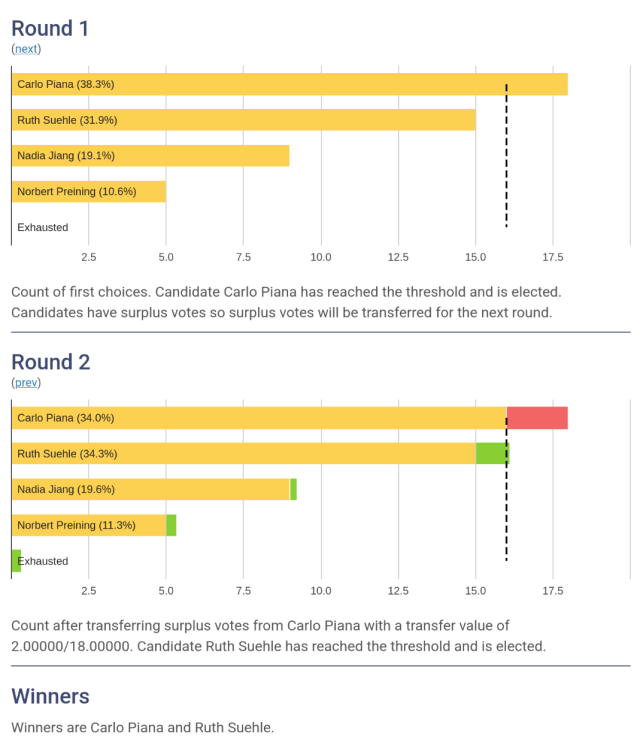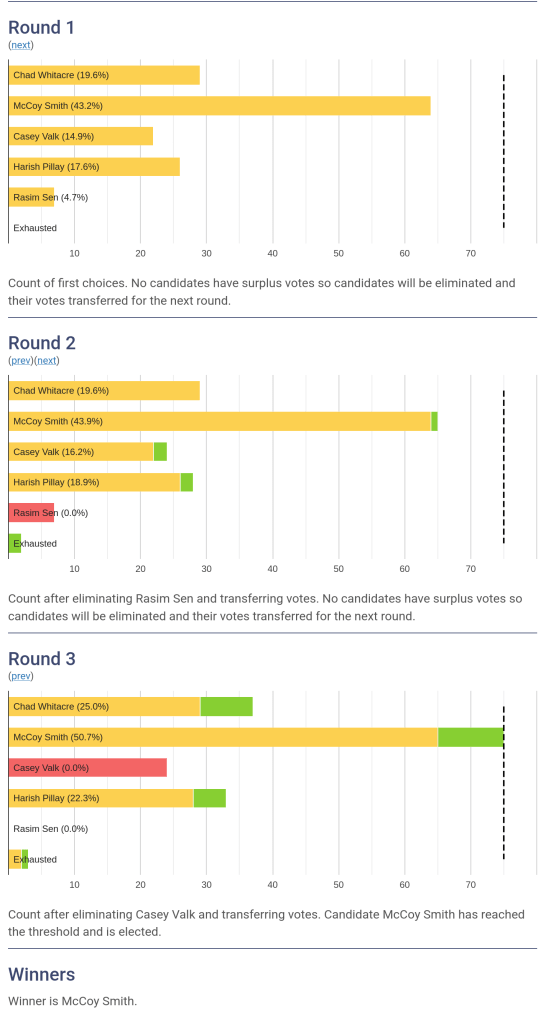Announcing the new directors of OSI board
The Open Source Initiative (OSI) board of directors met to validate the results of the polls, confirmed Carlo Piana as director and welcomed Ruth Suehle, recommended by Affiliates, and McCoy Smith recommended by Individual supporters, as new directors.
The OSI thanks all of those who participated in the 2025 board polls by asking questions to the candidates, engaging in discussions, and casting a ballot. Three candidates have been excluded from the final tally: Two were ineligible as they did not sign the current board agreement; one returned the signed agreement after the deadline passed. The Open Source Initiative is committed to upholding its mission while adapting to the evolving landscape of Open Source.
Next steps
We look forward to welcoming the new Directors at the April board meeting.
The board has directed the Board Development committee to run a retrospective by April 19, 2025 and bring to the board any recommendations for the future.
Complete elections results
OSI Affiliate directors polls 2025
Counting ballots using Scottish STV. There are 4 valid candidates competing for 2 seats. The number of ballots is 48 and there were 47 valid ballots and 1 empty ballot.

Winners are Carlo Piana and Ruth Suehle.
OSI Individual directors polls 2025
Counting ballots using Scottish STV. There are 5 valid candidates competing for 1 seat. The number of ballots is 159 and there were 148 valid ballots and 11 empty ballots.

Winner is McCoy Smith.
Update: April 21, 2025
From the Board of Directors of the OSI
Since OSI introduced individual member and affiliate votes for some board seats in 2013, we have been in a continuous process of improving those elections. This year, like in other election cycles, we discovered limitations and corner cases in our procedures. We renew our commitment to continuous improvement and have revised our internal procedures and templates to address the specific issues.
As we do each year, the OSI held an internal retrospective with directors and staff to reflect on public feedback, team observations, and technical difficulties, and identify action items for improvement. This retro included feedback given by several members via social media and discuss.opensource.org. We thank the members who provided this feedback; it helps us to identify problems that we would not have seen otherwise. Here are our takeaways from that process which involve the board and our members.
Improvements in communication
This election, as well as the OSAID process, made it apparent that our supporters want better channels to provide structured feedback to the Board about organizational direction, decisions, and priorities. Also, that it’s important to our supporters that feedback be clearly received and acknowledged, and that they receive word of any related board decision when one is made. Our elections are a poor vehicle for this kind of communication, so we must provide others.
The Board is working on a plan to reshape discussions with our supporters in order to realize better two-way communication. You can expect to hear more about this plan in upcoming months, and we hope you will help us improve it through your feedback.
As a smaller but nevertheless critical part of communication, we’ve been told by several of our members that they don’t understand the voting system we’re using, and it hasn’t been explained. In upcoming months, we will publish one or more articles and link to more materials explaining Single Transferable Vote and OpaVote, why we use them, and how your ballot expresses your opinion.
Improvements in candidate selection
In prior elections, we identified the issue that some candidates were not prepared for the actual requirements and duties of being on the OSI Board. We added candidate information sessions to the schedule and shared board materials with candidates in advance of the election. This was successful in allowing candidates to determine, themselves, whether they were ready to run for election, and it will remain a part of the election timeline.
What this election exposed was the need for the organization to also assess whether candidates were fully eligible to run and prepared to be seated on the board before voting begins. This is something we will add to the election timeline next year. While we have not finished figuring out all of the requirements for that assessment, part of it will be asking candidates to sign a Candidate Agreement* at nomination time. We also have some ideas on ways for potential candidates to have more information even before submitting a nomination.
The Board also noticed that, however successful we were in recruiting candidates (15 in this election), our candidate pool is not as representative of all of the different constituencies in our Open Source stakeholder groups as we would like it to be. We have begun working on some long-term plans to improve candidate diversity and involvement.
Conclusions
We acknowledge that we must improve all communications, so that we do not take for granted the level of familiarity any supporter may have with OSI’s work or its annual elections. OSI will improve transparency by creating better supporter engagement and feedback channels, clarifying the election process and candidate expectations, and enhancing public communication to be more inclusive and accessible.
* The board agreement governs our conduct as directors expected of leaders at OSI above and beyond, and the OSI code of conducts (License Review CoC, Event CoC, Discourse TOC) govern our whole community. To our knowledge, all involved with this election, even those who did not sign our board agreement, agreed to be held to the OSI code of conduct(s).
